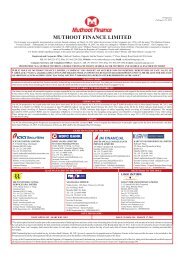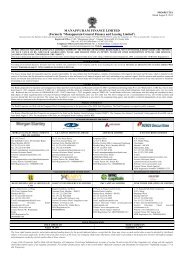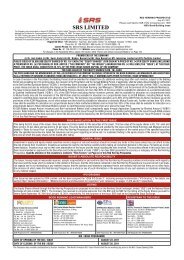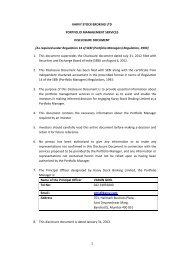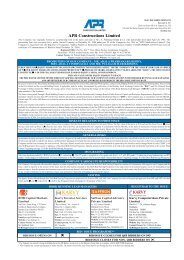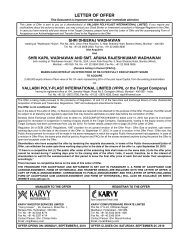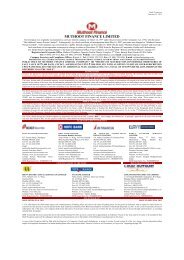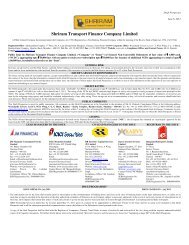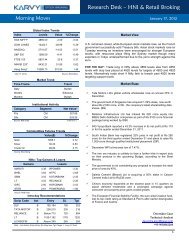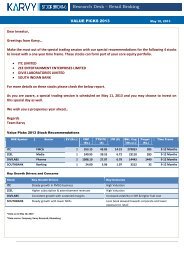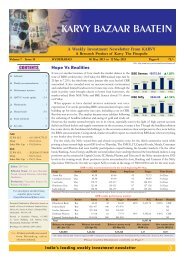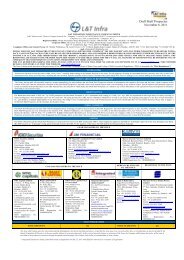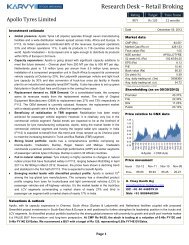- Page 1 and 2:
Draft ProspectusDated July 21, 2011
- Page 3 and 4:
SECTION I : GENERALDEFINITIONS / AB
- Page 5 and 6:
TermDebenture Holder (s)Debt Listin
- Page 7 and 8:
that notice of such early closure i
- Page 9 and 10:
TermROCRTGSSBISCRASCRRSEBIDescripti
- Page 11 and 12:
• Emergence of new competitors;
- Page 13 and 14:
SECTION II : RISK FACTORSProspectiv
- Page 15 and 16:
may be lower than the outstanding l
- Page 17 and 18:
and other liberalization measures a
- Page 19 and 20:
previous working relationship; succ
- Page 21 and 22: As part of our means of raising and
- Page 23 and 24: 24. We may have to comply with stri
- Page 25 and 26: valuation mechanism, which are pers
- Page 27 and 28: Risks Relating to the Utilization o
- Page 29 and 30: As on March 31, 2011, 24 % of our A
- Page 31 and 32: 5. Investors may contact the Regist
- Page 33 and 34: Lead Managers:JM Financial Consulta
- Page 35 and 36: Bankers to our CompanyANDHRA BANKCo
- Page 37 and 38: STATE BANK OF BIKANER AND JAIPUR1 s
- Page 39 and 40: warrant. CRISIL is not responsible
- Page 41 and 42: We leverage on the Shriram Group’
- Page 43 and 44: Access to a range of cost effective
- Page 45 and 46: THE ISSUEThe following is a summary
- Page 47 and 48: SUMMARY FINANCIAL INFORMATIONThe fo
- Page 49 and 50: B. SUMMARY INFORMATION OF OUR UNCON
- Page 51 and 52: C. SUMMARY INFORMATION OF OUR UNCON
- Page 53 and 54: ParticularsFor the year ended March
- Page 55 and 56: E. SUMMARY INFORMATION OF OUR CONSO
- Page 57 and 58: F. SUMMARY INFORMATION OF OUR CONSO
- Page 59 and 60: CAPITAL STRUCTUREDetails of share c
- Page 61 and 62: Date of AllotmentNumber of sharesis
- Page 63 and 64: Sr.NoCategory ofShareholderNumberof
- Page 65 and 66: Sr. No. Name of holder Number ofins
- Page 67 and 68: 11. List of top ten holders of Secu
- Page 69 and 70: Employee Stock Option SchemesPursua
- Page 71: STATEMENT OF TAX BENEFITSUnder the
- Page 75 and 76: SECTION IV : ABOUT THE ISSUER COMPA
- Page 77 and 78: Initially, the NBFCs registered wit
- Page 79 and 80: Overall Demand Drivers in the Two W
- Page 81 and 82: wheelers and similar forms of intra
- Page 83 and 84: Players are now adopting stringent
- Page 85 and 86: Growth in CV finance disbursements`
- Page 87 and 88: SI.No.YearTotalMSMEs(lakhnumbers)Fi
- Page 89 and 90: women and all loans to the North Ea
- Page 91 and 92: segment and the ability to provide
- Page 93 and 94: NBFCs in the Indian gold loans mark
- Page 95 and 96: We leverage on the Shriram Group’
- Page 97 and 98: Access to a range of cost effective
- Page 99 and 100: Our Company’s ProductsProduct Fin
- Page 101 and 102: All customer origination and evalua
- Page 103 and 104: maintain low gross and net NPA leve
- Page 105 and 106: The following table sets forth the
- Page 107 and 108: Credit RatingAgencyCAREInstruments
- Page 109 and 110: TechnologyWe use information techno
- Page 111 and 112: act as, and to undertake and carry
- Page 113 and 114: Company equal to or more than 7% of
- Page 115 and 116: (c) Term and termination: Either pa
- Page 117 and 118: Pursuant to the Agreement, the Inve
- Page 119 and 120: • more than 50% of the fully dilu
- Page 121 and 122: OUR MANAGEMENTBoard of DirectorsThe
- Page 123 and 124:
Name, Designation,Age and DINNation
- Page 125 and 126:
commercial banks. He was the chairm
- Page 127 and 128:
Remuneration of the DirectorsThe in
- Page 129 and 130:
A. Audit CommitteeThe members of th
- Page 131 and 132:
To form Sub CommitteesD. Asset liab
- Page 133 and 134:
OUR PROMOTERProfile of our Promoter
- Page 135 and 136:
Particulars FY 2008 FY 2009 FY 2010
- Page 137 and 138:
Particulars FY 2008 FY 2009 FY 2010
- Page 139 and 140:
Sr.No.Name of Shareholder Address N
- Page 141 and 142:
PIJUSH GUPTA & COC H A R T E R E D
- Page 143 and 144:
8. This report should not be in any
- Page 145 and 146:
Annexure IShriram City Union Financ
- Page 147 and 148:
Annexure IIShriram City Union Finan
- Page 149 and 150:
Shriram City Union Finance LimitedA
- Page 151 and 152:
Annexure IIIShriram City Union Fina
- Page 153 and 154:
Annexure IVShriram City Union Finan
- Page 155 and 156:
Annexure IVShriram City Union Finan
- Page 157 and 158:
Annexure IVShriram City Union Finan
- Page 159 and 160:
Annexure IVShriram City Union Finan
- Page 161 and 162:
Annexure IVShriram City Union Finan
- Page 163 and 164:
Annexure IVShriram City Union Finan
- Page 165 and 166:
Annexure VShriram City Union Financ
- Page 167 and 168:
Annexure VShriram City Union Financ
- Page 169 and 170:
Annexure VShriram City Union Financ
- Page 171 and 172:
Annexure VIShriram City Union Finan
- Page 173 and 174:
Annexure VIIShriram City Union Fina
- Page 175 and 176:
Annexure VIIIShriram City Union Fin
- Page 177 and 178:
Annexure IXShriram City Union Finan
- Page 179 and 180:
Annexure IXC. Cash Credit from Bank
- Page 181 and 182:
Annexure XShriram City Union Financ
- Page 183 and 184:
Annexure - XIIShriram City Union Fi
- Page 185 and 186:
c. Fixed Assets, Depreciation / Amo
- Page 187 and 188:
g. Revenue recognitioni. Income fro
- Page 189 and 190:
j. Segment reportingThe company ope
- Page 191 and 192:
2010 - 20112. Notes to Accounts1. P
- Page 193 and 194:
c) Term Loans:i. From Financial Ins
- Page 195 and 196:
Changes in the present value of the
- Page 197 and 198:
Enterprises havingsignificant influ
- Page 199 and 200:
Deferred Tax AssetTiming difference
- Page 201 and 202:
Stock Options grantedThe weighted a
- Page 203 and 204:
12. SecuritizationThe information o
- Page 205 and 206:
c) All Debentures under (a) and (b)
- Page 207 and 208:
Balance sheetDetails of Provision f
- Page 209 and 210:
(Rs. In Lacs)Enterprises havingsign
- Page 211 and 212:
5. Deferred Tax Liabilities/(Asset)
- Page 213 and 214:
The details of Series I have been s
- Page 215 and 216:
Since the enterprise used the intri
- Page 217 and 218:
13.1 Licensed Capacity, Installed c
- Page 219 and 220:
) Term Loans:As at March 31,2009(Rs
- Page 221 and 222:
Profit and Loss accountNet employee
- Page 223 and 224:
The estimates of future salary incr
- Page 225 and 226:
7. Related Party DisclosuresRelated
- Page 227 and 228:
* Denotes transactions with Shriram
- Page 229 and 230:
(Rs. in lacs)As at March 31, As at
- Page 231 and 232:
Stock Options grantedSeries I:The w
- Page 233 and 234:
15. SecuritisationThe Company sells
- Page 235 and 236:
2007 - 20082. Notes to Accounts1. P
- Page 237 and 238:
2. Subordinated DebtThe Company has
- Page 239 and 240:
The principal assumptions used in d
- Page 241 and 242:
6. Related Party DisclosuresRelated
- Page 243 and 244:
9. Earnings per shareParticularsYea
- Page 245 and 246:
Income Tax/Wealth TaxDisputed Incom
- Page 247 and 248:
Stock Options grantedSeries I:The w
- Page 249 and 250:
15. SecuritisationThe Company sells
- Page 251 and 252:
2006 - 2007B) Notes to AccountsPart
- Page 253 and 254:
9. Expenses in respect of common br
- Page 255 and 256:
15. Details of Deferred Tax Liabili
- Page 257 and 258:
3(Rs. In lacs)As on March 31,Partic
- Page 259 and 260:
(Rs. In lacs)ParticularsAmount outs
- Page 261 and 262:
7 Investor group-wise classificatio
- Page 263 and 264:
PIJUSH GUPTA & COC H A R T E R E D
- Page 265 and 266:
Other consolidated Financial Inform
- Page 267 and 268:
Annexure IIShriram City Union Finan
- Page 269 and 270:
Shriram City Union Finance LimitedC
- Page 271 and 272:
Annexure IVShriram City Union Finan
- Page 273 and 274:
Annexure IVShriram City Union Finan
- Page 275 and 276:
Annexure IVShriram City Union Finan
- Page 277 and 278:
Shriram City Union Finance LimitedS
- Page 279 and 280:
Annexure VShriram City Union Financ
- Page 281 and 282:
Shriram City Union Finance LimitedS
- Page 283 and 284:
Annexure VIShriram City Union Finan
- Page 285 and 286:
Shriram City Union Finance LimitedS
- Page 287 and 288:
Shriram City Union Finance LimitedS
- Page 289 and 290:
Shriram City Union Finance Ltd.,Ann
- Page 291 and 292:
Shriram City Union Finance Ltd.,Ann
- Page 293 and 294:
Annexure XIShriram City Union Finan
- Page 295 and 296:
Shriram City Union Finance LimitedS
- Page 297 and 298:
(E)InvestmentsInvestments intended
- Page 299 and 300:
(K)Segment reportingThe company ope
- Page 301 and 302:
) Privately Placed Redeemable Non-C
- Page 303 and 304:
Balance sheetDetails of Provision f
- Page 305 and 306:
PaymentsEnterprises having signific
- Page 307 and 308:
(8) Deferred Tax Liabilities/(Asset
- Page 309 and 310:
The details of Stock Option plan ar
- Page 311 and 312:
In March 2005 the ICAI has issued a
- Page 313 and 314:
As per our report of even dateFor P
- Page 315 and 316:
Sr.No.Particulars16. Industrial Dev
- Page 317 and 318:
Sr.No.Particulars Date of sanction
- Page 319 and 320:
1. to declare and/ or pay dividend
- Page 321 and 322:
SECTION VI : ISSUE RELATED INFORMAT
- Page 323 and 324:
person, being a nominee, becoming e
- Page 325 and 326:
*With respect to applications recei
- Page 327 and 328:
e paid on the next working day. Pay
- Page 329 and 330:
Please note that failure to do so c
- Page 331 and 332:
We may at our discretion redeem the
- Page 333 and 334:
other NCDs in their place. The afor
- Page 335 and 336:
from the date of receipt of the app
- Page 337 and 338:
or entities.Applicants are advised
- Page 339 and 340:
3. Filing of the Prospectus with RO
- Page 341 and 342:
in the Application Form would be us
- Page 343 and 344:
B. Additional ApplicationsAn applic
- Page 345 and 346:
12. Allotment Advice / Refund Order
- Page 347 and 348:
iii) In the event, there are more t
- Page 349 and 350:
SECTION VII : LEGAL AND OTHER INFOR
- Page 351 and 352:
within the meaning of section 271 (
- Page 353 and 354:
OTHER REGULATORY AND STATUTORY DISC
- Page 355 and 356:
ActivityFees payable legal advisors
- Page 357 and 358:
(Source: www.bseindia.com)NSEMonth
- Page 359 and 360:
Year ended As at 31st March` In Lak
- Page 361 and 362:
(ii)NBFCs are not allowed to deal i
- Page 363 and 364:
when hire charges are actually rece
- Page 365 and 366:
different rates of interest for dif
- Page 367 and 368:
Labour LawsThe Company is required
- Page 369 and 370:
…Clause (3) of Article 42 at thei
- Page 371 and 372:
MATERIAL CONTRACTS AND DOCUMENTS FO
- Page 373:
DECLARATIONWe, the Directors of the



